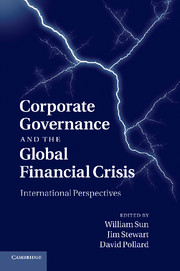Book contents
- Frontmatter
- Contents
- Figures
- Tables
- Contributors
- Acknowledgements
- 1 Introduction: rethinking corporate governance – lessons from the global financial crisis
- Part I The failure of the market approach to corporate governance
- Part II Ownership, internal control and risk management: the roles of institutional shareholders and boards
- Part III Post-crisis corporate governance: the search for new directions
- 12 Corporate governance, capital market regulation and the challenge of disembedded markets
- 13 The focus of regulatory reforms in Europe after the global financial crisis: from corporate to contract governance
- 14 The Great Recession's impact on global corporate governance
- 15 Corporate governance in the Islamic finance industry and mitigation of risks post the global financial crises
- 16 A holistic approach to corporate governance: lessons from the financial crisis and the way forward
- Index
- References
15 - Corporate governance in the Islamic finance industry and mitigation of risks post the global financial crises
Published online by Cambridge University Press: 05 August 2011
- Frontmatter
- Contents
- Figures
- Tables
- Contributors
- Acknowledgements
- 1 Introduction: rethinking corporate governance – lessons from the global financial crisis
- Part I The failure of the market approach to corporate governance
- Part II Ownership, internal control and risk management: the roles of institutional shareholders and boards
- Part III Post-crisis corporate governance: the search for new directions
- 12 Corporate governance, capital market regulation and the challenge of disembedded markets
- 13 The focus of regulatory reforms in Europe after the global financial crisis: from corporate to contract governance
- 14 The Great Recession's impact on global corporate governance
- 15 Corporate governance in the Islamic finance industry and mitigation of risks post the global financial crises
- 16 A holistic approach to corporate governance: lessons from the financial crisis and the way forward
- Index
- References
Summary
The ongoing financial crisis poses a series of challenges to policymakers and regulators as they attempt to stabilize financial markets and prevent a meltdown.
The political and popular backlash is eliciting and promising deep banking and financial sector reform, including in the Bretton Woods international financial architecture and a wave of regulations, encompassing corporate governance.
At the most basic level, the current crisis stemmed from excessive risk-taking for short-term profit by senior managements in highly leveraged banking and financial institutions. Boards were not fulfilling their obligations in ensuring the sustainability of their operations. Regulators were failing to provide satisfactory oversight of a system that provided incentive to leverage through securitization and sent the wrong prudential signals through the pro-cyclicality of capital adequacy and value-at-risk measures.
In other words, the crisis originated from failures on three principal levels:
the senior management level,
the board level and
at the regulatory level.
- Type
- Chapter
- Information
- Corporate Governance and the Global Financial CrisisInternational Perspectives, pp. 348 - 364Publisher: Cambridge University PressPrint publication year: 2011



